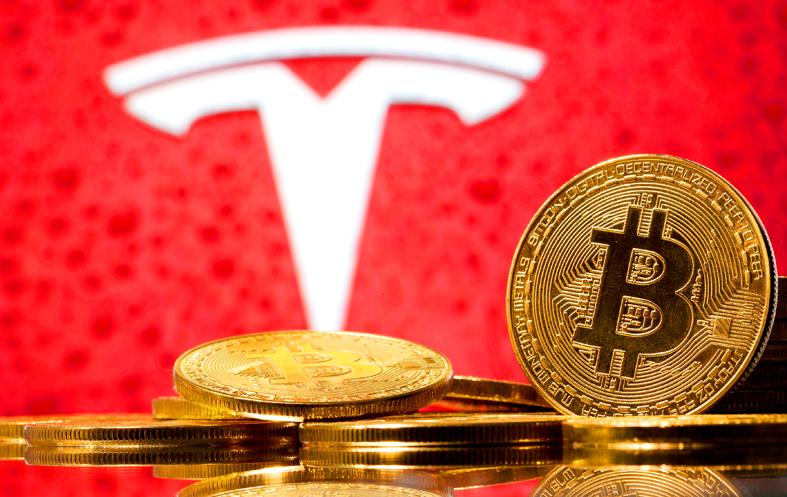Bitcoin extended gains past US$32,000, continuing a rebound after erasing most of its gains for the year. The latest leg up came in as Elon Musk, Jack Dorsey and Cathie Wood spoke during a panel on the future of bitcoin.
The largest digital currency rose more than 8 percent to about US$32,270 as of 2:27pm in New York on Wednesday. Other cryptos advanced too, including ether and dogecoin, while the Bloomberg Galaxy Crypto Index was also in the green.
Musk, the chief executive of Tesla Inc, reiterated his backing of bitcoin, saying he owns the token, along with dogecoin and ethereum.

Photo: Reuters
He added that like Tesla, Space Exploration Technologies Corp also owns bitcoin.
The token bounced back after sliding below US$30,000 earlier in the week, its first foray there since last month.
“The fear in the market was that if bitcoin breaks below the US$30,000 mark, the price will move lower violently,” said Naeem Aslam, chief market analyst with Ava Trade Ltd. “In reality, that is not what we have seen. The bitcoin price has been stable, and we have not seen any panic selling.”
Bitcoin and other cryptocurrencies have tumbled since the middle of May, wiping about US$1.3 trillion off their market value. Bitcoin has faced a range of obstacles, including stepped-up regulatory scrutiny in China, Europe and the US, and concerns about the energy needed by the computers underpinning it. Investors have also generally become more cautious about speculative assets.
Bitcoin might still test the US$25,000 support level in the coming weeks, Aslam said.
A break above US$32,000 would herald a stronger recovery, Saxo Bank chief investment officer Steen Jakobsen said.
“Bitcoin and ethereum did manage to pull a rally together after bitcoin had dropped down through the key US$30,000 area yesterday, but really needs to recover above US$32,000 sustainably to dig itself out of a hole,” Jakobsen wrote in a note.
Bitcoin’s advance this year has shrunk to about 8 percent following a slide from an April record of almost US$65,000. That compares with a 15 percent jump in the S&P 500 index this year.
Proponents say the virtual currency offers an inflation hedge and would win wider institutional acceptance. Such narratives were always controversial and are now under even more question, although bitcoin’s most ardent fans continue to predict big long-term returns.
“Regulatory and environmental concerns will likely keep bitcoin heavy but improvements on both fronts should happen before the end of the year,” Edward Moya, senior market analyst for the Americas at Oanda, wrote in a note.
Institutional investors “are ready to place big long-term bets” if a plunge toward US$20,000 is avoided, he added.

Quanta Computer Inc (廣達) chairman Barry Lam (林百里) is expected to share his views about the artificial intelligence (AI) industry’s prospects during his speech at the company’s 37th anniversary ceremony, as AI servers have become a new growth engine for the equipment manufacturing service provider. Lam’s speech is much anticipated, as Quanta has risen as one of the world’s major AI server suppliers. The company reported a 30 percent year-on-year growth in consolidated revenue to NT$1.41 trillion (US$43.35 billion) last year, thanks to fast-growing demand for servers, especially those with AI capabilities. The company told investors in November last year that

Intel Corp has named Tasha Chuang (莊蓓瑜) to lead Intel Taiwan in a bid to reinforce relations between the company and its Taiwanese partners. The appointment of Chuang as general manager for Intel Taiwan takes effect on Thursday, the firm said in a statement yesterday. Chuang is to lead her team in Taiwan to pursue product development and sales growth in an effort to reinforce the company’s ties with its partners and clients, Intel said. Chuang was previously in charge of managing Intel’s ties with leading Taiwanese PC brand Asustek Computer Inc (華碩), which included helping Asustek strengthen its global businesses, the company

Taiwanese suppliers to Taiwan Semiconductor Manufacturing Co. (TSMC, 台積電) are expected to follow the contract chipmaker’s step to invest in the US, but their relocation may be seven to eight years away, Minister of Economic Affairs J.W. Kuo (郭智輝) said yesterday. When asked by opposition Chinese Nationalist Party (KMT) Legislator Niu Hsu-ting (牛煦庭) in the legislature about growing concerns that TSMC’s huge investments in the US will prompt its suppliers to follow suit, Kuo said based on the chipmaker’s current limited production volume, it is unlikely to lead its supply chain to go there for now. “Unless TSMC completes its planned six

Power supply and electronic components maker Delta Electronics Inc (台達電) yesterday said it plans to ship its new 1 megawatt charging systems for electric trucks and buses in the first half of next year at the earliest. The new charging piles, which deliver up to 1 megawatt of charging power, are designed for heavy-duty electric vehicles, and support a maximum current of 1,500 amperes and output of 1,250 volts, Delta said in a news release. “If everything goes smoothly, we could begin shipping those new charging systems as early as in the first half of next year,” a company official said. The new